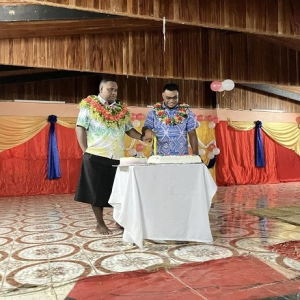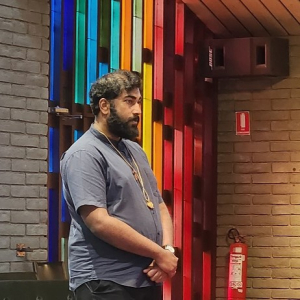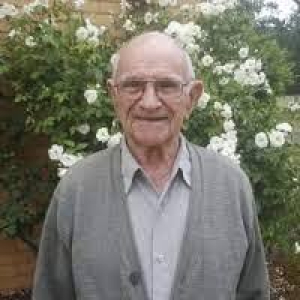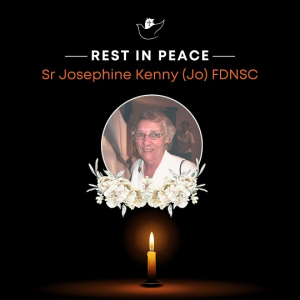Peter MALONE
Reg Pritchard MSC, Mass and Funeral
Reg Pritchard MSC, Mass and Funeral

Today, Mass for Reg was celebrated at the Henri Verius Chapel at Kensington Monastery.

Ed Travers MSC presided and preached.

In days to come, there will be a post with words from Ed Travers

The coffin left for St Mary’s Towers

Ed Travers at the graveside



Next Wednesday, Reg would have been 64 years professed as an MSC Brother. Thanks to the Brothers who sent the photos: Phil Reilly, Barry Smith, John Walker
Islands of the Pacific MSC Province Formation News
Islands of the Pacific MSC Province Formation News

Perpetual Profession
Last night, 7 Feb 2025, we celebrated the Perpetual Profession of our two brothers, Kirata Baare MSC & Suliano Qaliwaqa MSC at Holy Spirit Parish, Veivatuloa. The Mass was presided by our Provincial Superior Fr Vito Kelekele along with our MSC confreres.

This is a joyful moment for our congregation as we welcome our two brothers who have offered themselves totally at the service of God as Missionaries of the Sacred Heart. Let us remember them in our prayers as they prepare for their diaconate ordination. Ametur!
???????????????????????????????????? ???????????????????????????????????? 2025

On Sunday afternoon, February 9th, 2025, we are grateful to have received eight young men into our Pre-novice program. We warmly welcome Bakameta Bineati, Itinikiba Ioane, Teneneia Rui, Maiawa Ariki, Betero Etekia, and Tiinou Tibete from Kiribati, Maciu Kaunisela from Fiji, and Ouriel Musulamu from Futuna.

Welcome, Samuel Joshua to our MSC Pre-novitiate
Welcome, Samuel Joshua to our MSC Pre-novitiate

Samuel Joshua is from Singapore. He visited Cuskelly House last year and has come now to begin his Pre-Novitiate. Dominic Gleeson will be his director.

The Melbourne MSC Community, members of St Thomas parish, Blackburn, and some friends from Singapore, gathered in the church on Friday afternoon, February 14th for the ceremony for the beginning of this formation period for Samuel.

It was led by Dominic, scriptural reflections,

hymns and song and images,

lighting of special candles for the year, by Samuel, Mark Hanns, and Margaret O'Loughlin for the parish and the Lay MSC

presentation of a cross from the pre-novitiate men in India and greetings, also from the pre-novitiate group in Fiji (Dominic accompanied both groups last year in their 30 Day retreat.)

And blessing for Samuel as he begins, as Dominic explained using the MSC logo, continuing his path into the Heart of Jesus.

We were welcomed to refreshments and conversation after the ceremony.
The MSC Community, Melbourne, with Krish Mathavan visiting, John Mulrooney present for a Formation Committee meeting. Alo, Trieu and Hoa are away in Indonesia and Vietnam. Unable to be present, Frank Andersen.

Photos, Khoi Nguyen, Geralyn Anderson, Peter Malone

RIP, Reg Pritchard MSC

RIP, Sister Josephine Kenny OLSH, (16 June 1935 – 24 January 2025)
RIP, Sister Josephine Kenny OLSH, (9 October 1927 – 24 January 2025)

I have loved you with an everlasting love. I am constant in my affection for you.
These words from the prophet Jeremiah capture well the driving force behind our dear Sister Jo’s life, as she had absolute confidence in the one who called her into life and loved her unconditionally. At approximately 8am on Friday 24th January she gently slipped into the loving embrace of the one who had loved her with an everlasting love, throughout her 97 years.

Today we come together to celebrate the life of Jo Kenny, a Daughter of Our Lady of the Sacred Heart, whose ministry in health showed care, concern and compassion for all who came to her. Her dedication as a nurse came from her closeness to Jesus to whom she dedicated her life for 75 years.
To Jo’s family, and all her relatives and friends who loved her so much and are deeply saddened by her death, we offer our deep sympathy and love. You know well her deep love for you and her gratitude to you. We also offer sympathy to those who join us from around the world, especially, our Sisters.

Charleville
Josephine Margaret Kenny, or Jo as she was known by many, was born in Charleville, Queensland, on 9th October 1927, to Perce and Martha Kenny. When Jo was only 10 years old her mother died, this was a time of deep sadness for Jo, her dear dad and her siblings Patricia, Francis and James. Her father was determined to keep the family together and employed house keepers to help care for the young children. Four years after the death of her mother, Jo’s father remarried, and later Jo’s stepsister Margaret was born. Jo’s family moved to Hamilton and she attended Primary School at St Cecilia’s and completed her secondary education at All Hallows Mercy College in Brisbane.
Jo’s parents had a deep faith with love of the Mass. Their deep devotion to the Sacred Heart and frequent communion overflowed onto Jo. At an early age she began reading the magazine the ‘Far East and this awoke in her a deep desire to go to the missions. In 1950, at age twenty- three she entered the novitiate at Hartzer Park in Burradoo and was professed in 1952; she was aptly named Sr Assunta, after the great Italian Missionary.
After five years doing general and obstetric nursing training at St Margaret’s Jo’s lifelong ministry and her epic journey as a passionate, enthusiastic nurse and missionary began as she flew out of Sydney destined for Papua New Guinea, the place she would call home for the next 16 years. After many days of travelling across the stormy sea she arrived at Rossel Island, an isolated, mission station with some of the most gentle people she had ever met. There Jo was on her own in the nursing field and despite the lack of resources and difficult conditions Jo felt ‘extraordinarily blessed’ in her work, as she had many opportunities to help mothers deliver their babies, a role she loved. Jo was an excellent nurse, compassionate, resilent and hardworking. She endured the many difficulties living in isolated missions with her reliance on the Grace of God.

Rossel Island
Jo spent most of her time in PNG between Sideia, Rossel Island and Nimowa. After one local Sister was trained as a nurse Jo felt sure more would follow and so she decided to return home and continue her missionary vocation in Australia. After undertaking some studies in Theology Jo asked to go to the Northen Territory. In 1977 she had her first experience with Aboriginal people when she arrived at the East Arm Leprosarium and although she only worked there for 1 year, it was the most influential experience in her 17 years of working with Aboriginal people.

East Arm
The Leprosarium was set up as more like a home than a hospital with both staff and patients forming a community of the heart founded on care, acceptance and love. It was here, Jo worked alongside Dr John Hargraves in the life changing work of microsurgery. Jo went on to Wurramyanga (formerly Bathurst Island). Here she delivered countless babies and was responsible for Infant and Maternal Health and the training of the Indigenous Health Workers. Jo was proficient in the Holyoake Support program for those recovering from drugs and alcohol and took a particular interest in the Indigenous men returning to the community after participating in this program, giving them the support, hope and confidence they needed to continue to better their lives. She had small huts built out bush for them while they recovered and would visit to talk, listen and counsel them until they were ready to return to the community. From here Jo went to work in Wadeye (formerly Port Keats). Although her ministry in health was often challenging she loved the aboriginal people and felt accepted by them as a friend. Jo regarded these friendships as the greatest treasure in all her missionary endeavours.

First OLSH Sisters arrive at Wadeye, 1941
Jo’s passion was to work with God’s anawim so she requested to work with refugees. She, along with Sr Moira Lynch, was the first Australian DOLSH to carry the flame of God’s love to the people in war torn South Sudan. When Jo arrived in Mapuordit, South Sudan they lived in simple tukuls (huts) made from bamboo. It was a very poor, physically uncomfortable mission, with no running water, sanitation or refrigeration. It was a dangerous mission at the height of the civil war,yet Jo and Moira’s courageous presence said to the people of Mapuordit, we see you, we love you, you are not alone in your suffering.

Mapuourdit
In later years Jo was missioned to South Africa and then she returned to the NT and made an outstanding contribution to the many ministries she was involved in: Palliative Care, Prison Ministry, East Timor Sunrise Group and St. Vincent de Paul Society.
To say that Sr Jo Kenny was a great nurse is an understatement. Jo nursed in many very difficult and challenging places, not just in Australia but around the world, she treated those suffering from Hanson’s disease, TB, Parkinson’s Disease, AIDS, Malaria, Typhoid, substance abuse, not just with her medical expertise but with inclusion and acceptance. With love! Jo was a skilful, totally devoted, gentle and caring nurse. In all of Jo’s achievements and there were many, she was humble.
In all things what was most important in Jo’s life is captured beautifully by a young woman in South Africa with whom she worked. When Jo was planning to return to Australia. The young women said, ‘what will we do without you?’, Jo assured her she had taught her everything and she was capable of continuing the work. The woman replied ‘the best thing you have taught me is to be kind’.

And Jo was kind, she spoke with her eyes. They were alive and always seeking to do good for people. She loved life and was a good friend to many. She enjoyed bush walking, cooking, sewing, reading and caring for her indoor plants. Jo valued her community members and was especially enriched by sharing life and faith with the Sisters in her community.
When it was becoming apparent that Jo’s’s health was failing she asked to transfer to St Joseph’s Aged Care Facility, she accepted her aging with her typical resignation. It was here that she was beautifully cared for until her death.
We will be ever grateful to Perce, Martha and the Kenny family for the gift of Jo to our Congregation.
Go in peace dear Jo, united with the one who says ‘I have loved you with an everlasting love’
Thank you for your faith - filled witness, generosity, diligence and humility and great missionary spirit. May your beautiful humble soul rest in peace.
Philippa Murphy FDNSC Provincial Leader
Seed of the Sacred Fig, The/ dân e-ye anjîr-e ma'âbed
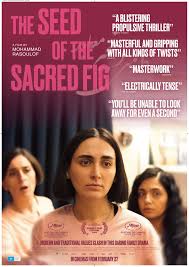
THE SEED OF THE SACRED FIG/ dân e-ye anjîr-e ma'âbed
Germany, 2024, 167 minutes, Colour.
Soheila Golestani, Missagh Zareh, Setareh Maleki, Mahsa Rostami, Niousha Akhshi, Reza Akhlaghirad.
Directed by Mohammad Rasoulof.
A drama which gained a great deal of attention in 2024, many awards and nominations, including Cannes, Golden Globe, Oscars, and, the award of the Ecumenical Jury in Cannes.
The action takes place in Tehran, 2022, the Women, Life, Freedom Movement, protests, police brutality, arrests, death sentences, on the occasion of the death in custody of the young Kurdish woman,Mahsa Amini, and her not covering her hair properly. The film has been written and directed by celebrated Iranian director, Mohammad Rasoulof, who served prison time because of official disapproval of his films and themes, who made this film secretly, carried it with him when he escaped from Iran and moved to Germany where postproduction was completed.
This is quite a long film, initially focusing on a government official, an investigator hoping to be a judge and provide a much better lifestyle for his wife and two daughters, but faced with a moral dilemma about death sentences and commands by prosecutors. He is a devout man, completely loyal to Allah and his understanding of Islamic law and to the state.
However, the first part of the film focuses on his wife, also strict, devoted to her husband, apprehensive about any dangers to his career, demanding with her daughters and not revealing details of their father’s life and work. Soheila Golestani’s intense performance is impressive.
Then the protests, the official condemnation of the young protesters, especially women against the wearing of the hijab, the director inserting actual footage from the protests and riots. The drama for the film heightens when one of the daughters gives her college friend some accommodation, despite the mother’s protest, but the student then is violently beaten, buckshot wound to her eye– and the challenge to the mother, a very careful scene with some tenderness as the mother tends to the wounded young woman.
One of the key issues of the film is the official handing of a gun to the father, and then its disappearing, a threat to his career when the authorities will think he is lax and careless, his making demands on his family, even taking them to a ‘therapy session’ with a skilled interrogator.
As his situation worsens, he takes the family to his old birthplace, his becoming more and more paranoid, including an effective episode where two protesters film and pursue the family. There is a highly melodramatic ending, the issue of the gun, his treatment of his wife and daughters, and their response to him, with the gun and the father’s collapse as well as that of the disillusionment of his wife.
Iran is always in the headlines, its political connections, considered part of the “axis of evil”, its official religious stands as the Islamic Republic of Iran, connections with terrorism in the Middle East, stories of harsh and unjust imprisonment, the morality police and their interventions. Which indicates that this should be a must see film.
There is a verbal prologue to the film which serves as a metaphor for Iran and for the action of the film:
"Ficus Religiosa is a tree with an unusual life cycle. It seeds, contained in bird droppings, fall on other trees. Aerial roots spring up and grow down to the floor. Then, the branches wrap around the host tree and strangle it. Finally, the sacred fig stands on its own."
Macbeth/2025
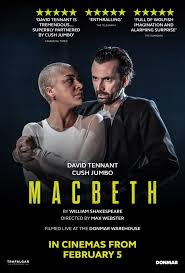
MACBETH
UK, 2025, 114 minutes, Colour.
David Tennant, Cush Jumbo, Cal MacAninch, Noof Ousellam, Moyo Akande, Casper Knopf, Jatinder Singh Randhawa, Rona Morison, Brian James O'Sullivan, Ros Watt, Benny Young
Directed by Max Webster; Capture directed by Tim Van Someren.
For just over 400 years, Shakespeare’s Macbeth, The Scottish Play, has been regularly performed. And, there have been several film versions including those by Orson Welles, Roman Polanski, filmed stage versions with Kenneth Branagh, Ralph Fiennes, and the basic plot being used for several gangster films like Joe Macbeth and Geoffrey Wright’s version updated to Melbourne.
In the last decade there have been Justin Kurzel’s version with Michael Fassbender and Marion Cotillard as well as Joel Coen’s version with Denzel Washington and Frances McDormand.
But, here is Macbeth with a Scottish accent. And a number of the other characters as well. And it is a striking performance, especially with his accent, by popular film and television star, David Tennant. At the outset, he makes Macbeth’s character his own and doesn’t let go. Sometimes, Lady Macbeth seems to dominate in interpretations. However, here she is played by Cush Jumbo, strongly intense but never dominating Macbeth himself.
The rest of the cast is an ensemble, often standing in a row at the back of the stage, then emerging and taking on quite a range of characters. And there is a racial mix in the cast as well as two actresses taking on male characters, especially Ross and Malcolm. And amongst the ensemble are musicians playing on stage.
And, considering the stage, it is a white square, surrounded on three sides by the audience (wearing headphones so that they hear the Shakespearean language well and extraneous sounds are excluded). At times there can be some props carried on stage including the weapons. And, at the end, behind the stage there is a colourful nature panorama. The minimalist staging of the play works particularly well, making demands on the imagination of the audience.
But, one might say the triumph of this version is the decision to use close-ups throughout the film, bringing the audience so close to Macbeth himself, to Lady Macbeth in her scheming as well as in her guilty madness, to all the characters. But, best of all is the decision to have Macbeth, David Tennant, frequently in close-up, looking and speaking straight into camera, intense, confiding in us the audience, trying to make us complicit in his decisions, in his regrets, in his ruthlessness, in his ultimate disillusionment.
This certainly makes this version of Macbeth worth seeing, brief, running under two hours, on the move, intense for performers and for the audience.
This version has another special surprise. Often the Porter sequence is omitted.
It is intended are some comic atmosphere/relief before the full tragedy descends on us. In this version, the director has decided to do some stand-up comedy, touches of broad appeal, the comedian as the Porter, Jatinder Singh Randhawa, engaging with the audience, asking about their headphones, joking but eventually moving into the Shakespeare text. Quite a memorable interlude.
The director of the play is Max Webster, significant in the UK his creative work. However, there has to be a credit for the director for the “Capture” of the play for the screen, Tim Van Someren. His use of the close-ups has been praised, and, often, the camera looking straight down on stage and characters, keeping the camera moving for the action, a sense of stillness for the soliloquies and the reflections.
This version of Macbeth reminds us of the richness of Shakespeare’s language and the quotations we remember, the political complexities of the plot, the psychology of the downfall of an ambitious man and his supportive wife – there can be many more versions.
Maria/ 2024
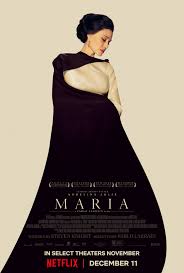
MARIA
Germany, 2024, 124 minutes, Colour.
Angelina Jolie, Pierfrancesco Favini, Alba Rohrwacher, Haluk Bilginer, Kodi Smit-McPhee, Stephen Ashfield, Valeria Golina, Caspar Phillipson.
Directed by Pablo Larrain.
It is almost 50 years since the death of famed opera singer, Maria Callas. She died in 1977, aged 53. Franco Zeffirelli made a film of the last week of her life, Callas Forever, with Fanny Ardant. Fanny Ardant collaborated with documentary filmmaker, Tom Volf’s documentary, 2017 documentary, Maria by Callas.
This is a film for both older audiences and younger audiences. It will offer older audiences the opportunity to remember, to listen again to the many arias throughout this film, the voice of Callas herself. The film will offer to those younger, who don’t remember her, a vivid portrait.
The film was written by English screenwriter, Steven Knight (Pretty Dirty Things, Peaky Blinders and many films and television series) but, importantly, was directed by the Chilean, Pablo Larrain, directors of significant political films but also two other biographies of significant 20th century women, Jackie (Jacqueline Kennedy Onassis) and Spencer (Princess Diana). Interestingly, there is the common denominator of Aristotle Onassis in Jackie and Maria.
And the choice of Angelina Jolie. She moves quite majestically through the film, often sweepingly, not only a prima donna, but one might say the sola donna, proud, sometimes arrogant in her interactions with people. The main focus is on the last week of her life, opening with her death, flashbacks of the previous week but, of course, flashbacks to past performances and achievements, and memories of her relationship with Onassis, and the insertion of an episode of meeting Jacqueline Kennedy at a party, present at the birthday where Marilyn Monroe sang (and some acid comments on her voice), and an icy encounter with JFK. (Callas in fact sang at this occasion.)
However, the main supporting characters here are her to devoted servants, her butler and her housemaid of many years, played by Italian stars, Pierfrancesco Favini and Alba Rohrwacher. We look at the ways she interacts with them, as she speaks to them, always superior, but a deep affection and sometimes dependence on them.
There is also the device of her wandering around Paris, stopping at various locations, flashbacks to performances, especially an orchestra playing in the rain, a scene from Madame Butterfly… And, during this wandering, there is a young filmmaker, Kodi Smit McPhee, called Mandrax, the drug that she was taking for support, her interactions with Mandrax, her conversations, his response, final hallucinations as she reviews her life.
This is a portrait of Maria Callas rather than a biography, an opportunity to listen again, to appreciate, to wonder at the complexities of personality for figures in the public eye.
- Audience knowledge of and admiration for Maria Callas, her voice, performance, career? What is knowledge of her life, mother, the war, criticisms of being fat, her emergence, her husband, the encounter with Aristotle Onassis, life with him, separating from him, her loss of her voice, her final years?
- The work of the director, his portrait of Jacqueline Kennedy, of Princess Diana, and the into cutting off the two women and their lives with Onassis?
- The framework of the film, the opening with Maria Callas’s death, her assistance standing around, the flashback of the seven days, the flashbacks within flashbacks, her performances, black-and-white photography, Angelina Jolie and her voice, the lip syncing with Maria Callas’s voice, the locations and her memories, her tablets, the filmmaker and her hallucinations, the conversations? The clash with her doctor? Of the theatre with the pianist, the technician in the spotlight, the journalist and his later confrontation?
- The importance of Ferrucio and Bruna? With Maria Callas for so many years, butler, housekeeper, with her in Paris, Bruna and the meals, the conversation, The ratio and the moving of the piano, concern about the doctor, that Maria Callas’ beck and call, her treatment of them, her dependence on them, their loyal service? The memories of being at her performances in the past? The concern in the present, her death?
- The film offering an overview of Maria Callas’ career, born in New York, her mother, the German soldiers, in Venice, the initial success, the visualising of the various concerts, the buildings in Paris, the performance in the rain with the orchestra, Madame Butterfly, her success, the decline? For testing her voice, but wanting to listen to her records? The final aria?
- Her personal relationships, the glimpse of her husband, at the party, the encounter with Onassis, his estimation of himself, rich and powerful, his infatuation with her, the invitation to the yacht, going with her husband, the beginning of the relationship, Onassis’ love for her, her moving away, not marrying, the issue of children, not wanting to be controlled? But her final visit to him?
- The contrivance of the scene at Kennedy’s birthday party, Marilyn Monroe’s happy birthday song, her comments of Marilyn Monror and the voice, the encounter with Jackie Kennedy, the yacht, the discussions with Kennedy himself, her estimation of himself and the relationships?
- The device of the film, the director and the name of the drug, Mandrax, the interviews, his responses, initially stolid, mellowing, the various scenes and interviews? The device, the hallucinations from her drugs? Herself revelations?
- The prima donna, the diva, her arrogance, treatment of people, the fan who had missed her performance and her treatment of him, the attack on the intrusive journalist, the conversation with the man at the bar and her music?
- The film as a portrait rather than a biography? Angelina Jolie’s performance? The sequences of actual Maria Callas during the final credits – more smiling and genial and throughout the film?
Waves/ Czech Republic
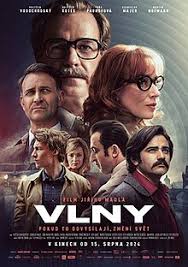
WAVES
Czech Republic, 2024, 130 minutes, Colour.
Vojtech Vodochodsky, Ondrej Stupka, Tatiana Pauhofova, Stanislav Majer,
Directed by Jiri Madi.
An important Czech film, important for audiences in the Czech Republic but of great interest beyond. It takes us back to the era of the Soviet Union, a reminder of Stalinist repression in the prologue to the film, deaths and imprisonments, censorship and suppression. But it also takes us into the atmosphere of change in Europe in the middle of the 1960s, the freedoms in the West, the infiltration into Eastern Europe – some exhilaration and some dire consequences.
This is the story of Czechoslovakia, 1967-1968, a movement of dissent, of openness, desire for freedoms, the radio campaigns on radio Czechoslovakia and fearless broadcasters. These radio waves are the waves of the title. Then there is the emergence of Alexandder Dubceck, from Slovakia, his talk of freedoms, his election as Secretary General of the Communist Party, the fall of the President for corruption, a new Presidente and the sweep of exhilarating change.
The pride of the period is re-created, the radio, the studios, the technology – but the focus is on two brothers, Thomas, technician and his younger brother, Pavel, caught up in the protests, at the end of police brutality. The main story is that of Thomas, quiet, protective of his brother, but invited by the key broadcaster to work in the studio, his becoming more and more involved, but put upon by the secret police for information.
With the exuberance of the freedoms (and listening to Western songs and their lyrics, dancing to the rhythms…), Moscow is not pleased and relying on countries of the Warsaw Pact, there is an invasion of Prague, the putting down of the uprising, violence in the streets, prayers in the churches, but Radio Czechoslovakia, with the help of Thomas, maintaining encouraging broadcasting throughout the invasion.
Released in the context of the Russian invasion of Ukraine, Waves is not only a reminder of the past, of repression and popular uprising, but also a perspective on contemporary Russian politics and world responses.
- The impact for a Czech audience? In countries which were part of the Soviet Union? Audiences who remember 1967-1968? A historical record and drama for those born later?
- The title, waves, radio waves, broadcasting and its influence, its impact in Czechoslovakia, the potential for change, for support during the Soviet and Warsaw Pact invasion? Authorities and their fear of radio, freedom of speech, need for censorship and approval of texts?xxxxx all the and
- The prologue, the Stalinist era, the statistics of deaths, imprisonments, the atmosphere of the Soviet Union? In the aftermath of World War II? The Eastern European countries, the development, stripped communism, the exclusion of the West and its capitalistic and modern culture? If the changes by 1967…? Czechoslovakia and its film industry at the time, Oscar-winning films, Mueller’s foreman and his departure to the US and Oscars?
- The drama enabling the audience to appreciate the changes in 1967, the movement for change, the role of radio, the role of demonstrations and protests and brutal police putdowns, the authorities and the harsh application of the law, censorship, deprivation of freedoms? The style of life in Eastern Europe? The influence of Moscow?
- The drama of the two brothers, the background of their parents deaths, Thomas and his technical skills, older, concern about app Pavel, demonstrating, his brother’s concern and phone calls, Pavel being beaten? His wanting to go to the audition for me la wiener, Thomas forbidding, is actually going, the tension in the room, the phone calls, Thomas answering the phone, bought into the interview and getting the job?
- Thomas, his age, personality, concern about his brother, his job, technical skills, Hoffman as his boss, urging him to take the position, his unwillingness, the authorities approaching, his going to the office, the interview with me la, his collaboration with the other technician? The fact of keeping this all a secret from Pavel?
- Wiener, his background, ideas, the background of his family and children, daring, the broadcasts, check radio and the international studio, the journalist, the stories, their being suppressed, the censorship, the manager and his intrusions and interviews? The range of journalists, the personalities, courage and daring, Vera and her African experience, stern? Thomas observing? The issue of the letters condemning the broadcast, sending Vera and Thomas to meet the students, the discovery of the fake letters?
- The various tapes, interviews, the importance of the bank account of the Pres’s son, the phone calls to France, recordings, exposure, leading ultimately to the Pres’s press conferences, his resignation?
- The emergence of Alexandre Deb, from Slovakia, his views, freedom of speech, the protesters and the printing of photos, pamphlets, distributing them, the role of the Secret Service and the police, the intrusions?
- Thomas, finding a place at the radio, friends, trusted? The secret police, the approach, pursuing Pavel, confronting Thomas, the threats against Pavel, his giving the clue, the New Year’s Eve party, the secret police, finding the tape, the arrest of the journalist? The interrogation about Vera, the irony of his telling them about the French language, the recipes hidden in her stove?
- Thomas, with Vera, her sternness, the party, the mellowing, the dancing, the sexual encounter? His finally telling her the truth, her walking away from him? Her being appointed to Tokyo?
- The role of Hoffman, the boss, his party loyalties, his pleading to Thomas, urging him to get information? With the Russian invasion, calling Thomas, forbidding any news? His involvement in the broadcasts, trying to close them down, the final offer to Thomas and Thomas rejecting it?
- The experience of 1968, the new Pres, his name of freedom, as party secretary, the introduction of ideas and styles from the west, the various songs throughout the film? An easier atmosphere? The democratic socialism?
- The Soviet invasion, the journalist going to Moscow, telling Prague the suspicions, condemned as fascists? The cutting off of the communication to the embassy? The invasion, the tanks, the plains, during the night, the reaction of the people, protests, stopping the tanks, the fires, the vicious response? The scene in the church, the priest and the people, St Francis prayer? Listening to the broadcasts?
- Malone, picnic, his collapse, the brain tumour, hospital? The role of the others maintaining the broadcasts, continued descriptions of the invasion, Vera at the microphone? The attack on the station, Vera and the others taking refuge in the Italian Embassy, continuing to broadcast, the BBC?
- The role of Thomas, enabling the continued links, the connection to the Army radio, the desperation, the timing, the technicians, the continued broadcasts, Hoffman and his anger?
- Thomas, enabling the broadcast, the soldier with his gunfire aimed at him, the manager of the station and his drinking and defiance? Thomas going home, the arrest, in the cell, let go?
- Georgia, in Moscow, six days of negotiations, failure of the Spring uprising?
- The irony of Thomas and his reporting to the secret police and their checking him out as an agent enabling him to promote the connections and the continued broadcasts?
- The effect of the personalising of the story with the two brothers, Pavel returning and the decision to stay – but audiences knowing that it would be more than two more decades before the collapse of the Soviet Empire?
Kinda Pregnant
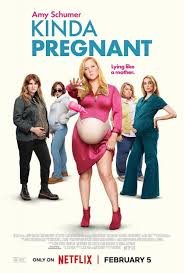
KINDA PREGNANT
US, 2025, 97 minutes, Colour.
Amy Schumer, Will Forte, Jillian Bell, Brianne Howey, Lizze Broadway, Urzila Carlson, Chris Geere, Damon Wayans Jr, Joel David Moore, Jackie Sandler, Duke McLeod.
Directed by Tyler Spindel.
Quite a facetious tone in the title. And, there is quite a lot of facetious humour throughout this comedy (a variation on a romantic comedy). But, with the addition of “pregnant”, there are also some serious themes.
Before venturing on watching Kinda Pregnant, audiences might like to know that it comes from the Happy Maddison Studios, Adam Sandler’s studios, and this is very much a comedy with serious overtones in the popular Adam Sandler style. In fact, Sandler’s wife, Jackie, appears as a yoga instructor. The film is directed by Sandler’s nephew, Tyler Spindel, his previous film for his uncle was The Out-laws.
But this is also an Amy Schumer film, her kind of comedy style, sometimes down and out, often wishful thinking, touches of concern about her appearance.
This time, she is Lainey, seen in the prologue as a little girl playing with her best friend Kate, and the game is giving birth, energetically. Lanie’s main wish is to become a mother. Skip to the present. She and Kate teach in a high school, some precocious brats in the class, of course, discussions about Romeo and Juliet. Lainey is all excited, invited to a dinner, sure that her partner is going to propose, all eagerly psyched up. Actually, he does propose (he is a smug cad) – but not at all what Lainey was hoping for. She goes into a spin.
So, comedy. But, shopping with Kate, Jillian Bell, who is now pregnant, she steals a pregnancy belly from a shop – and, in a range of circumstances, she becomes kinda pregnant. She goes to yoga classes and actually meets a very friendly mother, Megan, Brianne Howie. And who should be Megan’s brother, Josh, but the man she met by chance at a coffee shop and who was kind to her, Will Forte.
So, we can anticipate what is going to happen, when Lainey is at school and not pregnant, and when she is meeting with Megan, even babysitting, attending other classes, and pregnant. There are complications are school, especially with the hard-boiled counsellor, played by stand-up comedian from New Zealand (accent and all) Urzila Carlson, contrasting with the ultramodern and flighty teacher, Shirley, who is pregnant!
So, romance with Josh, complications at school, all coming to a head at a lavish baby shower. And, the continual wondering about how she is going to tell the truth and what will be the consequences.
At times the comedy is very broad, plenty of innuendo, a number of topical cinema and television references, and the satire of a sex scene which moves the censor’s classification from M to MA.
Allowing for all that and depending on one’s mood, there is quite a lot to enjoy.
- The tone of the title? Facetious, ironic? The touch of the serious? This for the style of the film throughout, characters, situations, issues?
- The comedy principally for the female audience? Identifying with characters and situations, pregnancy, birth, children and family? And the role of men and husbands? The different impact for the male audience?
- The production company, Adam Sandler, his style of American comedy, aspects of realism, surrealistic humour, jokes, innuendo, topical references, a succession of episodes and events building up a narrative, the past and the styles of stand-up comedy?
- Amy Schumer and her career, comedy, style, self-image, stand-up comedy?
- The title and the theme of pregnancy, serious admiration for pregnancy and birth, children, the impact for women, those wanting to be pregnant, those not wanting to be pregnant, and the gallery of mothers throughout the film, the central characters, and the women at the yoga and psychology workshops?
- The prologue, Lainey and Kate, playing, giving birth, the conversation, giving ground for their friendship?
- Lainey, in her 40s, at school, Romeo and Juliet, Liam and his crass remarks, Brett and his interventions, Dave and the invitation, expecting the proposal, going to the apartment, the dress, the dinner, the proposal for the threesome, the girlfriend arriving, the cake, her screaming and the scene? Disappointment? And the comic reaction with the class?
- Lainey, disappointed, going for the, coffee trying to avoid Shirley, talking with Josh, bonding, the discovery that he was Megan’s brother, living in the garage, happy in meeting him, the garage, the date, the ice skating rink, his bad experiences, the sexual encounter – and the farcical aspects of the sex sequence? His continued support, the truth and his disappointment? Garage door sequence, trying to persuade him to forgive Lainey? And the scene with the family who would witness the sex as well as other episodes, passing by?
- Kate, married, pregnant, sharing with Lainey, Mark and his seeming disregard and preoccupation? The two working at the school?
- The character of Fallon, New Zealand accent, counsellor, vaping pot, the oddball opinions, her behaviour, lesbian, friendship and advice?
- Shirley, the younger generation, oddball, pregnant, her boyfriend, dancing and 21st-century style? The bond with Fallon, with Kate and the sharing of the baby shower? Antagonism towards Lainey?
- Lainey, shopping with Kate, seeing the baby belly, stealing, pretending to be pregnant, going to the yoga class, the meeting with Megan, Megan friendly, at home with her husband, the young son and his mischievous behaviour? Friendship, the invitation to dinner, the boy with a knife and puncturing the fake pregnancy belly? Lainey always managing despite all kinds of impossible moments, skating, the splits…? Lainey and her loneliness, sadness, desperate for being pregnant? The enjoyment of looking after Megan and Steve’s son, reading to him, the joy of babysitting?
- The psychology class, with Megan, the carry on, the reality and the satire about pregnancy and psychological condition?
- Encounter with Dave, with the girl, seeing her pregnant, her saying triplets, his relief that they were not his? The satire on the callow self-seeking and self gratifying male? Contrast with Mark, absent-minded, yet loving? Steve, the family man, the humour?
- Lainey confiding in Fallon, helping her out, Shirley overhearing, spreading the rumour that Lainey was considering an abortion?
- The lavish baby shower, Shirley and her announcement, Megan and Steve present, Lainey’s speech, admitting the truth, the consequences?
- Lainey back to ordinary, lonely, being present Kate her, Mark present? The news that Megan had had a baby?
- The truth confrontations, the truth for Megan and the reconciliation? And the continued support of Kate?
- And the reconciliation with Josh – and the vehicle, the mad careering and crashing through and the up in the air ending for audiences to speculate on?

